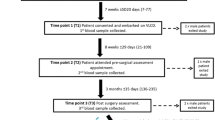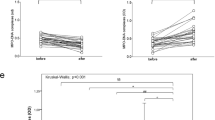Background: There is a large body of epidemiological data associating obesity with a wide variety of clinical disease processes, including cancer and wound infections. However, defining the specific defects of neutrophils has proved difficult and often contradictory. Methods: 27 patients having gastric bypass surgery for obesity (BMI>40) were compared with 10 normal controls (BMI<26). Relative neutrophil frequencies and expression of the activation antigens CD11b (integrin adhesion molecule), CD16 (Fc receptor), and CD62L (L- selectin), were evaluated by flow cytometry. Results: The study control group had a mean age of 37 ± 7.6 yrs (range 30 to 57) with no significant health problems.Their mean BMI was 23 ± 2.5 kg/m2 (range 21-26). The mean age of the sample group was 40.36 ± 13.7 yrs (range 18 to 60) with a mean BMI of 52 ± 8.2 kg/m2 (range 41 to 72).These patients had a large spectrum of diseases that afflict the morbidly obese, including hypertension (14), arthritis (10), exertional dyspnea (13), venous stasis (7), hypothyroidism (2), NIDDM (3), heart murmur (1), along with 8 smokers. The neutrophil frequency in the obese patients was comparable to the controls (control 49% vs obese 51%). Additionally, there was no apparent difference between obese and controls regarding CD11b or CD16 expression (424 vs 498 gmf) (267 vs 262 gmf). However, there was a significant reduction of CD62L (L-selectin) expression noted in the morbidly obese with respect to controls (102 vs 303 gmf, p<0.001). An increased percentage of eosinophils when compared to controls (6.7% vs 1.73%, p<0.001) was also observed. Conclusion: Discordant CD11b/CD62L levels, depressed levels of CD62L, and elevated eosinophil percentages support the hypothesis that a chronic inflammatory state exists in morbid obesity. Decreased levels of CD62L in the morbidly obese neutrophil pool possibly affect the neutrophil's ability to activate and migrate to sites of inflammation. This may play a role in the higher incidence of infectious complications seen in morbidly obese individuals.
Similar content being viewed by others
Author information
Authors and Affiliations
Rights and permissions
About this article
Cite this article
Cottam, D.R., Schaefer, P.A., Fahmy, D. et al. The Effect of Obesity on Neutrophil Fc Receptors and Adhesion Molecules (CD16, CD11b, CD62L). OBES SURG 12, 230–235 (2002). https://doi.org/10.1381/096089202762552674
Published:
Issue Date:
DOI: https://doi.org/10.1381/096089202762552674




